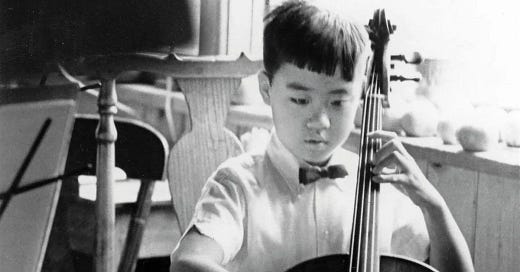It's birthday season, and I've treated myself to gig tickets — Angélique Kidjo and Yo-Yo Ma in concert.
Angélique is a Beninese-French singer-songwriter, actress, and activist. I was first introduced to her via her Talking Heads cover album Remain In Light, which reclaims and reinterprets the afrobeat-inspired original.
And if you’re not familiar with Yo-Yo, he’s one of the best-known cellists of his generation. On my voyages, I found this sweet video of him as a 7-year-old playing for JFK:
What impresses me is how Yo-Yo has managed to sustain joy and focus in his work, even after 61 years in the public eye.
Results = Sustained Focus + Curiosity
When I say results, I don’t necessarily mean the mainstream, normative version of “success” — fame, awards, financial rewards, blah-blah-blah. Instead, results mean the ability to keep doing what you’re doing in a way that maintains your interest and passion. Photographer Man Ray said, “There is no progress in art, any more than there is progress in making love. There are simply different ways of doing it.”
Sustained focus is not about staying in your lane but honing your craft. It reminds me of Malcolm Gladwell’s 10,000 hours of practice theory, in which it takes that long to become an expert or maestro in a given field. Rather than create a revolution, what is the evolution of your work?
Curiosity is a sense of wonder: experimentation, innovation, creative problem-solving and asking questions to learn. As soon as you stop asking questions, you stop learning.
“I think the thing to fight against is that if you get a lot of attention for doing something, then to get more attention, you keep doing the same thing.” — Yo-Yo Ma on collaboration
Yo-Yo Ma hasn’t pivoted to become a politician or a filmmaker; he’s consistently focused on his talent. But, there is doing the same thing, and then there’s doing the same thing with curiosity.
Curiosity has allowed him to keep playing and performing — everything from founding Silkroad, a collective of traditional musicians worldwide, to a cover of Ed Sheeran’s Shape of You [▶ listen on Spotify].
How do you spark your curiosity?
If you’re already an extremely curious person, you can skip this section. If not, like me, you sometimes need a little kindling, continue reading…
Firstly, we all need to fight the power within. Negativity bias is a massive barrier to us as adults — we are programmed to avoid the uncomfortable and rely on trusted “feelings” as opposed to facts. You might be surprised to hear that two-thirds of our beautiful brains are dedicated to sniffing out bad things.
“The amygdala—the brain region that regulates emotion and motivation—uses about two-thirds of its neurons to detect bad negative news” — Dr. Rick Hanson
Secondly, unlike children, adults do not possess an automatic sense of curiosity, but by cultivating it, we can achieve better results. A NASA study found that 98% of kids between the ages of 4 and 5 possess the traits of a "creative genius”; however, that rapidly dwindles. Five years later, only 30% of the same group of children scored the same, and then, when tested as teenagers, only 12%. Only 2% of adults achieved this genius level.
The good news is that if experimentation, innovation, and creative problem-solving are skills we are born with, we can reclaim them; we have to put in the effort and focus on how we think.
“Here’s what the creative process is: forming questions that cause answers that in turn, lead to better questions. Let’s say every time you don’t know something… you ask a question. This has two effects: (a) it immediately identifies what it is you don’t know, and (b) since you have now identified what you don’t know, you are much more able to find out.” – Viki King, How to Write a Movie in 21 Days
Focus on how you think
We must consciously slow down our thinking, ask why and keep our eyes open. And it’s okay to start small.
Seek out new inputs, whether walking a different path to the shop or trying a new dish. You could try daily journaling prompts. As I need to remind myself constantly (thanks, negative brain!), we must let go of the need to succeed; failure is the first opportunity to learn.
Or find out the answers to things you’ve always wondered about (queue the Wikipedia rabbit hole). Identifying knowledge gaps sparks curiosity and engagement. No question is stupid if it leads to a desire to learn more.
Now that our eyes are opening, you can apply curiosity to work, your passions, and your personal life. Start to ladder up into more significant questions: What happens if I combine this technique with that technique? What happens if we break the expectations of society? What happens if we flip the script?
Fun fact: Curiosity has a proven impact on businesses' bottom line.
Next steps
My next step in curiosity is… spending a Friday night listening to two masters of their crafts come together, wondering what it might sound like if a cello virtuoso comes together with a singer of everything from world music to jazz. I also commit to trying Writer’s Hours at the London Writer’s Salon for a week.
What are yours? How can you commit to being a little more curious? I’d love to know — hit reply and share.
Amber








